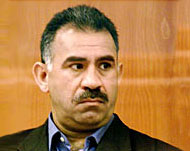Dutch court blocks Kurd extradition
A district court in the Netherlands has blocked the extradition of an alleged Kurdish rebel leader wanted in Turkey for her suspected role in a series of bombings in the 1990s.

The ruling on Monday countered a decision by Dutch Justice Minister Piet Hein Donner in September and a Dutch Supreme Court ruling that Nuriye Kesbir could be handed over.
Kesbir has fought her transfer to Turkey since she was detained in the Netherlands in September 2001 while illegally entering the country. Her applications for asylum have been rejected.
She is allegedly a leading member of the Kurdistan Workers Party, or PKK, a rebel group seeking an independent Kurdish state in south-eastern Turkey.
Approval
Donner approved her extradition after receiving guarantees from Turkish authorities that Kesbir would receive a fair trial.
|
“The minister, based on the current guarantees from the Turkish embassy, could not reasonably arrive at a decision to allow the extradition” District court, |
In its ruling, the district court in The Hague ruled that the Dutch government could not take Turkish embassy guarantees as a sufficient basis for going ahead with the extradition.
“The [justice] minister, based on the current guarantees from the Turkish embassy, could not reasonably arrive at a decision to allow the extradition,” it said.
The court said the justice ministry had overlooked several reports from the United Nations and other organisations which accused Turkish authorities of torturing Kurdish activists.
The Dutch government has not yet decided whether to appeal the ruling, a ministry spokesman said.
Accusation
Turkey accuses Kesbir of training female PKK fighters and of planning and making armed attacks that resulted in 144 deaths.
 |
|
Violence has dropped sharply |
She has denied the charges but confirmed holding a leadership position in the PKK. Kesbir’s lawyer was not immediately available for comment on Monday’s ruling.
The PKK has for 20 years been fighting for a Kurdish homeland in south-east Turkey, a conflict that has killed more than 30,000 people, mostly ethnic Kurds.
Violence dropped off sharply with the capture of PKK leader Abdullah Ocalan in 1999 and most PKK guerrillas withdrew to northern Iraq.
Turkey has approved a flurry of human rights reforms in recent years in its drive to join the European Union, but critics say they are not being put into practice on the ground.
They have included abolition of the death penalty, scrapping the military-dominated state security courts, easing restrictions on freedom of expression, clamping down on torture and extending cultural rights to the Kurdish minority.